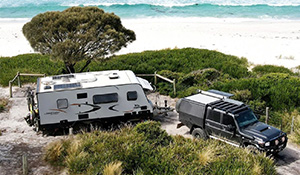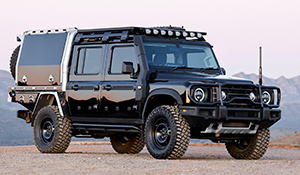2018 Jeep Compass Trailhawk Review
The Jeep Compass Trailhawk is a compact SUV with four-wheel drive (albeit on-demand and no low-range), a monocoque body structure and fully independent suspension. The Compass Trailhawk is ‘Trail Rated’ and, so, it lives up to the Jeep philosophy (at least from a marketing perspective), but given it’s going up against the likes of the Kia Sportage, VW Tiguan, Hyundai Tucson and potentially the Mazda CX-5, it’s a bit like bringing a gun to knife fight, unless you’re looking for something compact with off-road capability and then it’s likely to be just what to doctor ordered.
The Trailhawk has a redesigned front bumper for improved approach angle, revised rear bumper and an off-road suspension package that lifts ‘running ground clearance’ to a claimed 225mm (by many other motoring outlets) (when we measured it we saw 216mm with the exhaust pipe the lowest part of the vehicle – this tallies with the actualy ground clearance that Jeep claims for the Compass Trailhawk, so where the other figure has come from is confusing), up from the Limited 4×4’s 212mm, and increased maximum wading depth of 480mm, up from the Limited 4×4’s 405mm. Neither of those measurements are particularly flash, but they’re not bad either.
As mentioned, the Trailhawk also offers Jeep’s Active Drive Low 4x4 System and this requires a little unpacking, because the naming is very misleading.
The system is the same as that in the Jeep Renegade Trailhawk this means there’s a Drive Mode selection to choose from, a 4WD Lock which suggests that it locks drive 50:50 front to rear, only it doesn’t and you can tell that because when you select this mode and turn the vehicle on a high-traction surface, like in a car park, there’s no graunching which my old Toyota Tercel used to do when it was ‘locked’.

And then there’s the 4WD Low button. This isn’t low range and while Jeep and plenty of motoring journalists have banged on about a 20:1 crawl ratio via 4WD Low, engaging 4WD Low (or not) doesn’t change the speed the Compass Trailhawk is capable of. Rather, 4WD Low forces the vehicle to start in first gear rather than its default of second gear, tweaks the throttle sensitivity, and also the stability control and brake traction control, which Jeep calls a Brake-Lock Differential System, only it isn’t. It’s just brake traction control, meaning one wheel loses traction and its stopped with drive going to the wheel(s) with traction.
The on-board computers can also tweak the ABS if you’re driving on dirt roads, forcing the wheel to slip less than it would on bitumen, allowing you to build a wedge of dirt ahead of your tyres and stop a little quicker on loose surfaces. Annoyingly, the vehicle forces you to stop before engaging 4WD Low, for dramatic purposes surely, since there’s no actual changing of gears taking place. But you can disconnect it on the fly.
Standard equipment on the Compass Trailhawk includes 17-inch alloy wheels with 225/60R17 Falken Wildpeak H/T tyres (including full-size spare on a steel rim), 8.4-inch touchscreen with satnav, Apple CarPlay and Android Auto, recovery points front (x2) and rear (x1), underbelly skid plates, black anti-glare bonnet decal, cloth and leather seats, reversible cargo mat, and all-weather floor mats.
Options include a dual-pane sunroof ($1950), Comfort & Convenience group ($2850) that consists leather seats, power eight-way driver’s seat (with memory) and four-way passenger’s seat, heated front seats, passive entry, remote start and keyless go, and Advanced Technology Group ($2450). Our test car had all these cost options fitted. Standard pricing for the Trailhawk is $44,750+ORC; our test car realised $52,000+ORC with all its options.

What’s the interior like? Looks are quite deceiving for the Compass Trailhawk’s interior. The compact exterior dimensions suggest it’ll be tight on the inside, but it’s class competitive for room inside the cabin, both in the front and the back. The boot will come back at the end of this section.
As you can see from the images, the Trailhawk adds red accents which lift the interior beyond that of its lesser siblings in the range. There’s plenty of soft-touch materials used around the cabin, with harder, but fine-grained plastics used in the places where you need stronger, harder-wearing stuff, like the door linings and the under-side of the dashboard. I’d go so far as to suggest that the interior quality is on-par with anything from, say, Hyundai or Kia and better than Mazda, but it’s not quite as nice as either the VW Tiguan or Skoda Kodiaq (yes, the Kodiaq’s a seven-seater, but you get what I mean).
The leather trimmed seats in our test car look nice and squishy but they’re not. They’re supportive enough, sure, but on first acquaintance they seem quite hard. And that’s a sensation that doesn’t go away with one tester, perhaps harshly, suggesting they felt like plastic chairs. I can’t comment on the standard seats as our car had the cost-optional Comfort & Convenience pack which offers eight-way adjustment for the driver and four-way for the front passenger.
It’s quite easy to get comfortable behind the wheel with a decent range of adjustment; only the cramped driver’s footwell and slightly off-set pedals knock the shine off the driving position. My right foot constantly rubbed against the side of the footwell, to the point where I had to slide my foot right over on the pedal to avoid fouling, and then I had to be careful my hoof didn’t hit the brake at the same time, and I was wearing narrow sand shoes.

The dashboard is dominated by the 8.4-inch touchscreen which controls everything from climate, to your phone, and navigation. While I’m not a fan of touchscreen-based climate control adjustment, using the screen is way better than trying to reach right down to the bottom of the dash to get at the hard climate controls. Indeed, all the controls at the base of the dash fall away from the driver and are almost impossible to reach or see when moving without taking your eyes off the road for too long.
There are storage bins in all four doors for 500ml drink bottles and two cupholders on the centre console. There’s a small storage bin between the two front seats with a padded lid that slides forwards and backwards. Back to the infotainment briefly, though. The Compass runs the latest-generation UConnect (and we’re writing up a longer review of the system) and it’s a ripper of a system, easily one of the best infotainment units you’ll find on any car, regardless of the price.
The menu structure is easy to follow and the buttons respond beautifully to the first touch. Using the virtual audio and climate controls is much easier than using the hard switchgear at the base of the dashboard, and because these controls are in two places, the dashboard looks cluttered. Apple CarPlay and Android Auto are standard on the Trailhawk but cost-options on some models in the range.

Climb into the back of the Compass and there’s plenty of room for two adults in the back. The almost flat floor in the back means you can sit three people across the back, but not three adults; there isn’t enough elbow room. Legroom is okay; I had a lanky six-foot, two-inch tall friend sat behind the driver’s seat and he said he was comfortable.
There’s decent foot wiggle room too which helps a lot and the rubber floor mats do a good job of catching dirt and mud before it gets to the carpet and they don’t feel slippery when your shoes are wet.
There are directional air vents at the back of the centre console along with 12V and USB outlets, and the back of the middle seat folds down to form and arm rest but, at the same time, leaves a hole into the boot. This is either a handy or untidy feature, depending on your point of view.
The boot space isn’t huge as I found when I fitted a soccer kit bag, and six balls. One extra soft bag was added and that was the boot filled.
There’s 438 litres of storage space and it’s a nice square space, just a bit small, that said, there is a full-size spare, on a steel rim, under the floor which is more than you get with many of this car’s competitors. You can increase the storage space by dropping the 60:40 split-fold rear seats, but you’ll need to find somewhere to stash the hard parcel shelf.

What’s it like on the road? Under the bonnet of the Compass Trailhawk is a 2.4-litre four-cylinder turbo-diesel making 125kW at 3750rpm and 350Nm of torque at 1750rpm. This is mated to a nine-speed automatic transmission, and while the transmission is a slick shifter, I can’t help but feel it’s one or two too many ratios for this engine.
See, the transmission tends to run to top gear as quickly as it can and this often leaves the thing feeling a little lethargic in some situations, like when you’re overtaking on hills or just trying to maintain your speed on a hill. Indeed, travelling one-up on a relatively steep hill and with my foot flat to the floor, I watched the speedo roll back from 100km/h at the base of the hill to 90km/h by the time it hit the top. Even pumping the throttle to try and get it to kick down didn’t work, because it had already kicked down a gear. Hmmm.
This surprised me, because when Deano tested the Compass Trailhawk earlier this year, he came away impressed with the engine and transmission, praising its low-down grunt. And, to be fair, I only noticed a lack of puff on long hills. Pulling away from a standing start, around town and on the highway, the Compass Trailhawk’s diesel engine and transmission feel much more comfortable.

This turbo-diesel isn’t a quiet engine, although once you’re at a constant speed and the transmission jumps to top gear then its clatter does become hushed. And, there’s little wind or tyre noise. The Compass Trailhawk, despite its slightly higher ride height (2.5cm more than other models), offers a more sporting (read: firm) ride than you might expect.
The short-travel suspension thumps off harder hits, although it doesn’t buck the vehicle but it can cause occupants to groan. But the suspension settles with weight on board; and we suspect it was tuned with four-up in mind. On smooth roads the ride is great, but as the surface breaks down, as it does on some sections of our road loop, the ride becomes knobbly.
There’s little bodyroll through corners and the grip is impressive on both bitumen and well-graded dirt with the all-wheel drive system quick to activate the rear end (the Compass Trailhawk, like the other Compass 4x4 variants, is an on-demand all-wheel drive).
The steering is well weighted but lacks feel requiring familiarity to make you feel totally comfortable to push the thing, as its firmer suspension set-up seems to be urging you to do – across smooth roads, anyway. But that seems to go against the grain of a family-oriented SUV which should err towards comfort.

What’s it like off the road? Across our off-road loop, the Limited 4x4 would have struggled to traverse the terrain we put the Trailhawk across, simply because of clearance and the approach angle (we still managed to rub the underside of the nose when angling across the ditch you see in the pictures). The Trailhawk gets a more angled snout which increases the approach angle from 16.8-degrees on the Limited to 30.8-degrees. Break-over and departure angles are also different, because of the additional clearance.
Despite the fact there’s a 4WD Low button down at the base of the dashboard, the Compass Trailhawk doesn’t have low-range, just a 4WD Low button that forces the Compass to start in first gear and while Jeep describes a 20:1 crawl ratio this is nothing other than the first gear ratio and final drive multiplied together, so, there’s no actual reduction of the first gear via 4WD Low.
The Compass Trailhawk is, 90% of the time, a front-wheel drive vehicle when left in Auto Mode. This is great when cruising along the highway as it means you’re saving fuel but, at the same time, it takes the system a while to work out what it’s doing on rougher terrain and can even leave you stranded when left in Auto.
For instance, I left the Compass in Auto when trying to angle across the deep ditch pictured hereabouts. As soon as the thing became cross-axled, meaning the diagonally opposite wheels became light, the Compass just sat there spinning its wheels and going nowhere.
Reversing back and selecting 4WD Low (which only activates if you also select Rock Mode) made a huge difference, though, it was literally like night and day – thanks to drive being locked between the front and rear and the low first-gear; the traction control also becomes more aggressive in this drive mode.
There was still some wheel spin as the diagonally opposite wheels became light but the traction-less wheels were killed after a moment of spin and the vehicle drove across the ditch lifting its lack-of-droop wheels high into the air. None of this car’s competitors would have made it across the ditch quite so effortlessly.

There’s very little suspension droop (Jeep claims 20cm of articulation) and so the Compass Trailhawk will pick up a wheel very quickly and easily, so the trick is to really concentrate on your line when off-road with the Compass and, obviously, where possible keep all four wheels on the ground.
Progress is just too slow if you’ve got to stick in 4WD Low and Rock Mode but if you’re careful with your lines and avoid anything where you’re picking up wheels, you won’t need to use it too often. That said, on slow-going, rough sections of track, absolutely select 4WD Low and Rock Mode…it’ll give you better traction and control if you’re lifting wheels.
The firm suspension that affords such, perhaps out of place, cornering composure, really bites when you’re driving across rocky tracks with the vehicle bucking and bumping from side to side as you go from one rock to the next. I drove the Compass Trailhawk further off-road than I imagine any owner would and probably further off-road than Jeep intended, but with a Trail Rated badge slapped onto its flank, one would expect the thing to be handy. See, the only way you can get a Trail Rated badge is complete a series of tests, but just what those tests are for the various vehicles Jeep builds, Jeep won’t say. Moving on.
Despite its looks and badges, this thing isn’t a proper off-roader (don’t misunderstand me, this thing is easily one of the most capable non-low-range 4x4s on the market), but except for the aging Suzuki Grand Vitara (with proper low-range) there’s not a single other compact SUV, at this price point, that will go as far off-road. So, I guess that means Jeep’s done what it set out to do with the Compass Trailhawk.

What about safety? The Jeep Compass has been awarded a five-star ANCAP rating, scoring 35.93 points out of 37. Standard safety equipment across the range includes reversing camera, seven airbags, speed limiter, tyre pressure warning, stability control, roll mitigation, traction control and trailer sway control. The Trailhawk adds front and rear parking sensors and a tyre pressure monitoring system.
It’s a decent safety pack, but with many of this car’s competitors offering more advanced active safety features, like AEB, as standard, it’s a shame you’ve got to pay a lot more to get them on the Compass. The cost-optional Advanced Technology pack ($2450) on the Trailhawk (and Limited variant too) includes, Forward Collision Warning, Land Departure Warning, Blind Spot Monitoring, Rear Cross Path Detection, Advanced Brake Assist and Adaptive Cruise Control with Stop & Go Function.
So, what do we think? The Compass Trailhawk is one of the most rugged compact SUVs you can buy. It’s not a rock crawler but those wanting a little more grip when the going gets rough will find the Compass Trailhawk is capable enough of getting around in the rough stuff. The on-road ride and handling is firm but, on the right road this means it’s not a bad thing to punt…although that might be slightly missing the point of a family-oriented SUV.
The boot isn’t huge, but the front and back seats will accommodate a family with more than enough creature comforts to keep them happy, and the infotainment system is easily one of the best you’ll find on any car and at any price.
Words by Isaac Bober via Practicalmotoring.com.au Photos by Manufacturer










